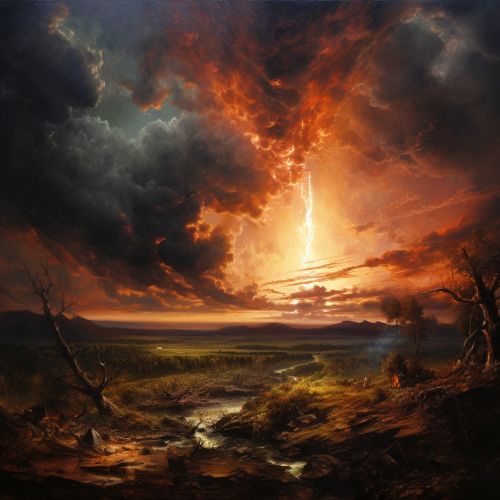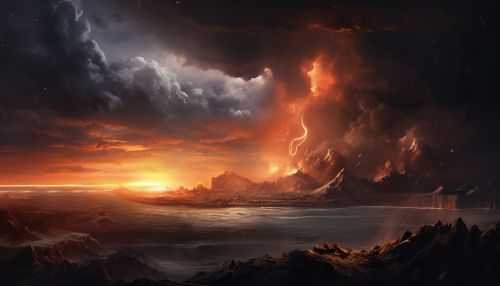Apocalypse
Definition and Etymology
The term "apocalypse" is derived from the ancient Greek word "apokálypsis," which translates to "an uncovering" or "revelation." In religious contexts, it often refers to a prophetic revelation, especially concerning a cataclysm in which the forces of good permanently triumph over the forces of evil. In a broader sense, the term has come to denote any large-scale catastrophic event that threatens the extinction of mankind and life on Earth.
Historical and Religious Context
The concept of an apocalypse is deeply ingrained in various religious traditions and mythologies. In the Christian tradition, the apocalypse is described as a series of cataclysmic events leading to the end of the world, culminating in a final battle between good and evil. This narrative has significantly influenced Western perceptions of the apocalypse.
In Zoroastrianism, an ancient Persian religion, there is a similar concept of an apocalyptic end times. The Zoroastrian apocalypse involves a final battle, followed by a judgment day and the resurrection of the dead. This concept may have influenced later Abrahamic religions.
Norse mythology also contains apocalyptic elements, most notably in the tale of Ragnarok, a series of future events including a great battle foretold to ultimately result in the death of a number of major figures, the occurrence of various natural disasters, and the subsequent submersion of the world in water.


Modern Interpretations and Speculations
In modern times, the term "apocalypse" is often used to refer to any end-of-the-world scenario. These can range from nuclear warfare and pandemics to climate change and asteroid impacts. The concept has been widely explored in various forms of media, particularly in science fiction and horror genres.
Nuclear warfare is a common theme in apocalyptic scenarios. The potential for global destruction through nuclear weapons has been a significant concern since the mid-20th century. The concept of a nuclear winter, a severe and prolonged global climatic cooling effect hypothesized to occur after widespread firestorms following a large-scale nuclear war, is a common apocalyptic scenario.
Pandemics have also been a source of apocalyptic fears, particularly in light of the 1918 influenza pandemic and more recent outbreaks such as HIV/AIDS and COVID-19. The potential for a highly virulent and lethal disease to cause widespread death and societal collapse is a common theme in apocalyptic literature and film.
Climate change is another modern apocalyptic concern. The potential for rising temperatures, sea levels, and extreme weather events to disrupt ecosystems and human societies is a growing concern. Some scientists and environmentalists warn of a potential "climate apocalypse" if drastic measures are not taken to mitigate these changes.
Asteroid impacts are another potential cause of an apocalypse. While the probability of a large asteroid hitting Earth is low, the potential consequences of such an event are catastrophic. The Cretaceous–Paleogene extinction event, which is believed to have been caused by an asteroid impact and resulted in the extinction of the dinosaurs, is often cited as an example of a potential future event.
